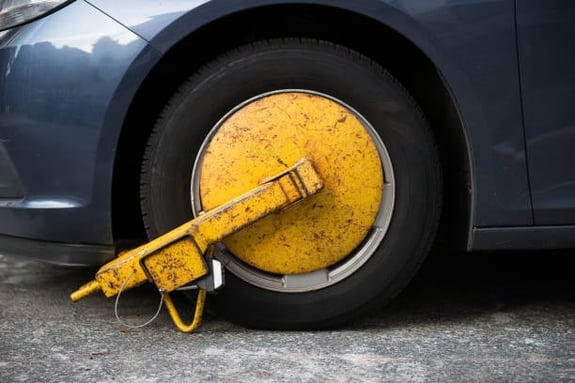Parking is one of the most common “hot topics” that community associations face, particularly with those communities that were built with insufficient parking facilities. Parking problems range from unauthorized vehicles to non-conforming vehicles and/or vehicles parked in prohibited areas.
As an alternative to towing, many Associations are considering immobilization, also known as boot or booting, which involves placing a mechanical device on a parked vehicle, designed to be attached to the wheel or tire to prohibit its operation. To the extent an association is deemed to be private property, shouldn’t the association have the absolute right to boot offending vehicles? Not quite so.
While, the Florida Statutes impose specific requirements on a community association or its designated representative prior to the towing of an improperly parked vehicle, there is presently no State Statute that specifically addresses booting of vehicles. However, city and county ordinances have specific requirements that must be followed.
In Miami-Dade County, Section 30-479 of the Miami-Dade Code of Ordinances sets forth specific requirements for immobilization or booting of vehicles. Generally speaking, Associations in Miami-Dade County wishing to boot vehicles must post prominently notice that vehicles are subject to immobilization. The mechanism for booting the vehicle must be installed on the front wheel of the driver’s side of the vehicle (if feasible), and an 8 ½ by 11-inch sticker must be placed on the rearmost portion of the window adjacent to the drivers’ seat of the vehicle, warning that any attempt to move the vehicle may result in damage to the vehicle, and providing specific contact information for the company that booted the vehicle. An association that improperly causes a vehicle to be immobilized may be liable to the vehicle owner for the cost of the services provided, any damages that results from the immobilization, the immobilization and attorney fees. Moreover, an Association cannot, by release or waiver limit or avoid liability for damages to a vehicle that has been improperly booted.
In Broward County, Section 20-176.19 of the Broward County Code of Ordinances also requires compliance with specific posted notice requirements, which must be prominently placed at specific locations throughout the property, specifically indicating, among other pertinent information, that a vehicle is “subject to immobilization”. The Broward ordinance, has several exceptions and/or alternate notice requirements, based on the size/type of property. Notably, when ordering immobilization of vehicles in Broward County, the Association is required to provide written instruction as to each individual vehicle to be immobilized. Moreover, the Association must have a written contract with the towing/immobilization company.
Palm Beach County’s ordinance (Section 19-131) on immobilization does not specifically apply to booting vehicles on private property such as that of an Association. Rather, the ordinance appears to address immobilization in the context of vehicles parked in spaces in all county-owned or -operated property designed as "RESERVED," "HANDICAP," in a traffic or fire lane, in an area designated as a "NO-PARKING ZONE," or beyond the time limitations in a temporary parking space. If an Association wants to boot/immobilize a vehicle in Palm Beach County, it should engage with an experienced vendor and ensure that at a minimum, all towing ordinances are followed. However, it’s important to note that there is no specific regulation that addresses private property booting/immobilization in Palm Beach County.
In general, it is important to keep in mind that a vehicle may only be towed or booted from the property if the vehicle is parked on the property without the proper permission of the Association. Many community associations try to utilize towing or booting as an enforcement mechanism for unlawfully parked vehicles. However, this is not appropriate. Towing and/or booting should not to be used for unlawful vehicles themselves such as, for example, a commercial vehicle which is prohibited because the Association’s documents do not allow same. Its also important to note that an association may not accept money or other valuable consideration from any towing company or other person for the privilege of towing or removing vehicles from the Association’s property.
Lastly, before implementing any towing and/or booting policy, an association should work closely with its legal counsel to ensure that said policies do not run afoul of applicable law.
